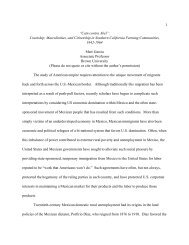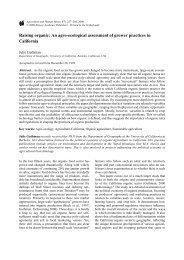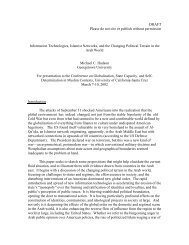The Death of Ramon Gonzalez and the 21st Century Dilemma
The Death of Ramon Gonzalez and the 21st Century Dilemma
The Death of Ramon Gonzalez and the 21st Century Dilemma
Create successful ePaper yourself
Turn your PDF publications into a flip-book with our unique Google optimized e-Paper software.
Globalization on <strong>the</strong> Tomato Trail, follows Oaxacan women migrants through Mexico,<br />
<strong>the</strong> United States, <strong>and</strong> Canada. xx In Culiacan, a greater share <strong>of</strong> <strong>the</strong> labor force now<br />
comes from Guerrero, Chiapas, <strong>and</strong> Central America, where rural crisis sends out a<br />
stream <strong>of</strong> people who are more desperate <strong>and</strong> less-experienced in finding work <strong>and</strong> lesswell<br />
supported by formal <strong>and</strong> informal migrant networks.<br />
Continuing problems <strong>of</strong> pesticide abuse<br />
As we will discuss in more detail below, some people had expected that NAFTA<br />
would result in major changes in pesticide regulation <strong>and</strong> practice. Those opposed to<br />
NAFTA argued that it would result in <strong>the</strong> lowering <strong>of</strong> regulatory st<strong>and</strong>ards in <strong>the</strong> United<br />
States. Proponents <strong>of</strong> NAFTA maintained that <strong>the</strong> opposite would occur: NAFTA would<br />
tend to bring Mexican regulatory st<strong>and</strong>ards closer to those <strong>of</strong> <strong>the</strong> United States. As I will<br />
discuss later, <strong>the</strong> effect <strong>of</strong> NAFTA on pesticide regulation has been modest on both sides<br />
<strong>of</strong> <strong>the</strong> border, though, as we will see, Canadians have cause for complaint that NAFTA<br />
has dragged Canadian st<strong>and</strong>ards down to <strong>the</strong> laxity <strong>of</strong> U.S. st<strong>and</strong>ards.<br />
<strong>The</strong> problems <strong>of</strong> pesticide use in Mexico documented in <strong>the</strong> first edition have<br />
been shown to be a continuing <strong>and</strong> pervasive problem, before <strong>and</strong> after NAFTA. All<br />
indications are that farmworkers in Mexico <strong>and</strong> elsewhere in Latin America have<br />
continued to face <strong>the</strong> kind <strong>of</strong> dangers from pesticides <strong>and</strong> o<strong>the</strong>r forms <strong>of</strong> abuse that <strong>the</strong>y<br />
did during <strong>the</strong> field studies undertaken for <strong>the</strong> first edition <strong>of</strong> <strong>Ramon</strong> <strong>Gonzalez</strong>. Douglas<br />
Murray, a sociologist <strong>and</strong> occupational health specialist, published Cultivating Crisis:<br />
<strong>The</strong> Human Cost <strong>of</strong> Pesticides in Latin America, that demonstrated <strong>the</strong> severity <strong>of</strong><br />
damage done to farmworkers by heavy, uncontrolled pesticide use. Working primarily in<br />
Nicaragua, his study benefited from <strong>the</strong> ability to work under a S<strong>and</strong>inista government





